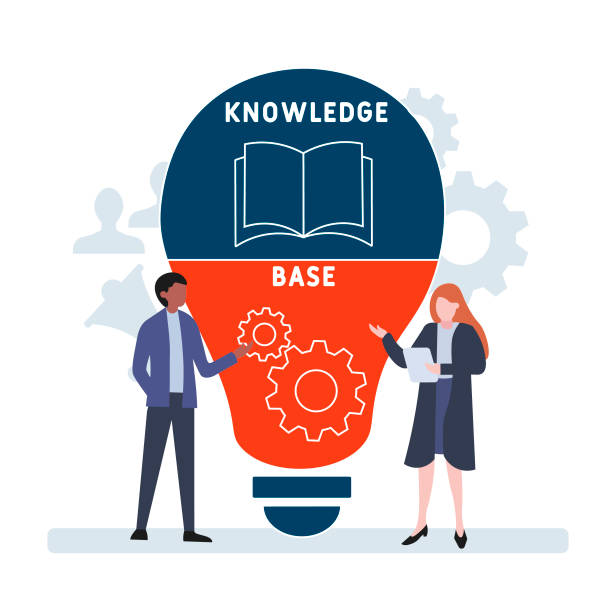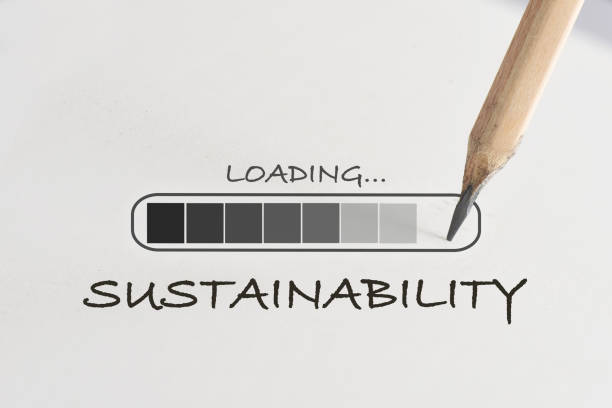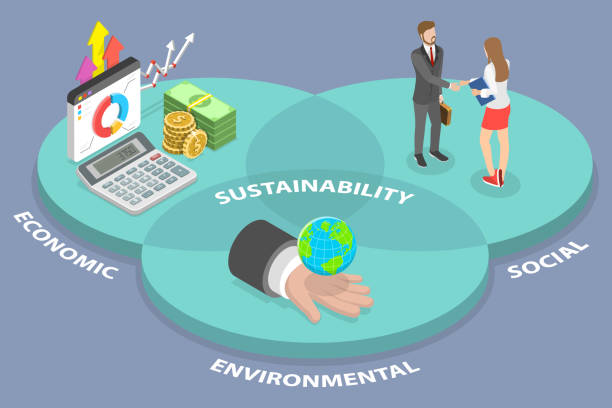As the accounting profession grapples with global challenges like climate change and social equity, Sustainability Integration has become a pivotal element in the ICAG qualification, equipping future chartered accountants in Ghana to handle environmental, social, and governance (ESG) issues head-on. This article explores how sustainability weaves through the curriculum, from basic awareness to strategic application, highlighting its role in shaping ethical, forward-thinking professionals. Drawing from our overview in the Introduction to ICAG Qualification Levels: Knowledge, Application, and Professional, which breaks down the three-tiered structure—starting with foundational knowledge in four subjects, advancing to practical applications across six, and culminating in high-level judgment in four more—this piece zeros in on how sustainability enhances that progression, ensuring graduates not only master technical skills but also contribute to a resilient economy.
Sustainability Integration at the Knowledge Level: Building Foundational Awareness

Right from the get-go, the ICAG syllabus plants sustainability firmly in the Knowledge Level, where the emphasis lies on grasping core concepts that underpin the entire qualification. This level, with its four subjects, introduces aspiring accountants to the basics, and sustainability pops up notably in Business Management and Information Systems. Here, candidates dive into entity types, purposes, and objectives, learning to describe business ethics, corporate social responsibility (CSR), and ESG issues. It’s straightforward stuff—think explaining how a non-profit in Ghana might balance social goals with environmental stewardship—but it sets the tone for why sustainability matters in accounting.
The syllabus spells it out clearly: students must “describe the nature of business ethics, corporate social responsibilities (CSR) and environmental, social and governance issues (ESG).” This isn’t just lip service; it’s about recognizing that accountants can’t ignore the bigger picture, like how climate risks affect supply chains in Ghana’s cocoa industry. By integrating these elements early, ICAG ensures that even at this introductory stage, you’re not just memorizing debits and credits but questioning how business decisions impact the planet and people.
Transitioning to other subjects, sustainability subtly influences areas like Financial Accounting, where qualitative characteristics of information tie into transparent reporting on environmental impacts. Though not explicit, the level’s outcomes foster an awareness that carries forward. For instance, in discussing entity objectives, you might explore how sustainability goals align with profit motives, drawing on real-world examples from Ghanaian firms adopting green practices. This foundational sustainability integration helps avoid silos, making sure that by the time you hit Application, you’re ready to apply these ideas practically. And if you’re prepping, tools on Knowsia—like question banks tailored to ESG scenarios—can make this level feel less abstract and more actionable.
Sustainability Integration in the Application Level: Applying Concepts to Real Scenarios

Moving up, the Application Level cranks up the intensity, where sustainability integration shifts from description to hands-on use in solving everyday accounting problems. Spanning six subjects, this stage demands a working knowledge, and sustainability shines in several spots. Take Financial Reporting: candidates discuss how sustainability and climate-related risks affect financial statements, including actions by the International Accounting Standards Board (IASB) on sustainability. The syllabus mandates: “Discuss the impact of sustainability and climate-related risks and opportunities on the preparation of financial statements. Discuss the actions taken by the IASB in respect of sustainability.”
This means you’re not just noting risks; you’re evaluating how droughts in northern Ghana might impair assets for a farming co-op, integrating ISSB standards into reports. It’s practical, pushing you to blend technical skills with ethical considerations. Similarly, in Management Accounting, sustainable cost management takes center stage. Outcomes require identifying ways management accountants consider sustainability issues, like optimizing resources to cut waste in manufacturing while tracking carbon footprints.
Public Sector Accounting and Finance amps it up further, with a focus on sustainability reporting and ESG requirements for public entities. Students must “discuss the requirements for public sector entities to observe sustainability reporting and ESG requirements,” which could involve analyzing how Ghana’s government budgets for renewable energy projects under IPSAS frameworks. This integration reflects Ghana’s push toward sustainable development goals (SDGs), ensuring accountants in public roles champion transparency on environmental spends.
In Audit and Assurance, sustainability creeps in through ethical lenses, though less dominantly, as you apply assurance principles to reports that might include ESG data. Financial Management and Principles of Taxation round it out by touching on sustainable financing options and tax incentives for green initiatives. Overall, this level’s sustainability integration bridges theory and practice, using scenarios that mirror Ghana’s economy—think advising on tax breaks for solar firms or auditing sustainability claims in mining operations. Continuity from Knowledge Level makes sense; what you described before, you now apply, building competency step by step.
Advanced Sustainability Integration at the Professional Level

At the Professional Level, sustainability integration reaches its zenith, demanding discerning judgment in complex, ambiguous situations across four subjects. Here, ICAG expects you to advise at a high level, and sustainability is front and center in Corporate Reporting. Candidates advise on ESG issues, sustainability reporting, and standards, including frameworks like the Task Force on Climate-related Financial Disclosures (TCFD), Global Reporting Initiative (GRI), ISSB, and Sustainability Accounting Standards Board (SASB). The syllabus details: “Discuss the background to the development of sustainability reporting and the role of… TCFD, GRI, ISSB, SASB,” and “Explain and apply the provisions of the IFRS Sustainability Standards.”
This isn’t passive learning; you’re critically discussing integrated reporting’s impact, advising organizations on applying the International Integrated Reporting Council’s (IIRC) framework, and weighing benefits like blockchain for transparent ESG tracking. In Advanced Audit and Assurance, it extends to “discuss appropriate procedures for audit and assurance engagements for corporate social responsibility and sustainability reports,” ensuring auditors can verify claims on everything from labor practices to emissions.
The Strategic Case Study ties it all together, where sustainability informs governance and strategy. Outcomes include assessing corporate governance policies on social responsibility, sustainability, and environmental matters, evaluating approaches like “environmentally driven strategy.” You might analyze a case where a Ghanaian bank integrates SDGs into lending, recommending improvements amid climate risks. Advanced Taxation touches on ethical tax planning with sustainability in mind, like incentives for eco-friendly investments.
This level’s integration emphasizes strategic value—sustainability isn’t a add-on but core to decision-making, aligning with IFAC and IESBA standards. Graduates emerge ready to lead, say, in advising on Ghana’s transition to a green economy. The progression feels natural; built on lower levels, it culminates in professional prowess.
Assessing Sustainability Integration in ICAG Exams

Exams test sustainability integration rigorously, aligning with formats from MCQs to case studies. At Knowledge, it’s about identifying ESG basics in objective tests. Application exams demand applying concepts, like computing sustainable costs or discussing climate impacts on statements, often in scenario questions. Professional papers, with their three-hour durations and pre-seen materials, require evaluating sustainability in complex cases—perhaps advising on ISSB compliance in a merger.
Pass marks at 50% reward depth; partial credits go to reasoned ESG analyses. Progression rules ensure mastery, with no exemptions skipping sustainability-heavy Professional papers. This assessment mirrors real audits or reports, fostering skills for Ghana’s sustainability reporting mandates.
Challenges and Solutions in Sustainability Integration

Integrating sustainability isn’t without bumps. One challenge: balancing technical depth with broad ESG knowledge, especially in a fast-evolving field like ISSB updates. Ghana-specific issues, like informal sectors ignoring environmental regs, complicate application. Students might struggle with ambiguity in cases, where climate data isn’t black-and-white.
Solutions abound, though. ICAG’s phased CBE rollout aids interactive sustainability sims. Prep resources tackle this—knowsia AI tools, for example, generate ESG scenarios for practice. Mentorship and group studies help, turning challenges into growth opportunities.
Benefits of Sustainability Integration for Accountants

The upsides of sustainability integration are huge. It produces versatile pros who boost Ghana’s economy, advising on green finance or sustainable public spending. Employers snap up these skills amid global ESG demands; think enhanced job prospects in multinationals. Personally, it instills purpose—accountants drive positive change, like reducing corporate carbon footprints.
Broader benefits include ethical resilience; integrating sustainability curbs scandals, building public trust. For ICAG, it aligns with international standards, elevating Ghana’s accounting stature.
Future Trends in Sustainability Integration for ICAG

Peering ahead, sustainability integration will evolve with trends like AI in ESG analytics and stricter ISSB enforcements. By 2029, expect more on digital sustainability, like blockchain for supply chain transparency. ICAG might incorporate continuous assessments, blending sustainability into portfolios.
Ghana’s alignment with AfCFTA could emphasize cross-border ESG, while climate policies drive deeper integration. Staying ahead means lifelong learning—platforms like Knowsia let you teach sustainability modules, earning while sharpening expertise.
Conclusion: Embracing Sustainability Integration for a Greener Future

In essence, sustainability integration in the ICAG accounting qualification transforms it from a numbers game to a force for good, embedding ESG across levels to create impactful professionals. From Knowledge basics to Professional strategies, it equips you for Ghana’s sustainable push. As the levels overview shows, this fits seamlessly into the structure, amplifying benefits. Dive in, leverage resources, and you’ll not only qualify but lead in a world where accounting meets accountability.

